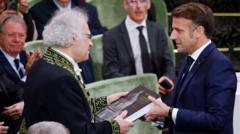In a grand ceremony held at the historic Collège des Quatre-Nations, the French Academy presented the long-awaited ninth edition of the Dictionnaire de l’Académie Française to President Emmanuel Macron. It has taken nearly 40 years to complete this edition, which succeeds the last one published in 1935. The Academy was established in 1635 by Cardinal Richelieu, tasked with regulating and refining the French language.
Despite the painstaking effort undertaken by a group of 40 esteemed members, commonly called "immortals," there are concerns about the dictionary’s relevance in today’s rapidly changing linguistic landscape. While this new edition introduces 21,000 entries that mirror French society from the 1950s to the present, critics argue that many of the additions, such as “soda” and “yuppie,” do not reflect current colloquial usage.
The slow production rate of entries has led linguists to question the utility of the dictionary. Many contemporary terms, including "tiktokeur," "vlog," "smartphone," and "émoji," are glaringly absent from the work, indicating a disconnect with modern media and communication. As linguistic evolution accelerates, the Academy’s effort to remain authoritative feels increasingly obsolete.
Compounding these issues is the Academy’s slow adaptation to recent societal changes. For instance, while the latest section of the dictionary includes discussions on gender-neutral titles, early printed versions still reflect traditional definitions that no longer align with contemporary societal standards. This discrepancy raises the question of how effectively the dictionary can serve as a linguistic reference in an age of digital lexicons that evolve much more swiftly.
Under the leadership of writer Amin Maalouf, the committee continues to meet frequently to discuss and finalize definitions. However, the pace of this process falls short of capturing the dynamic nature of language today. As discussions for the next edition begin, many wonder whether it can avoid the pitfalls of its predecessor and truly reflect the vibrant complexities of the modern French lexicon.



















